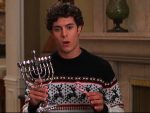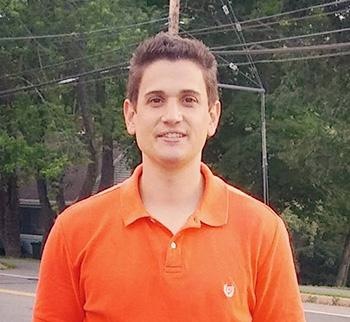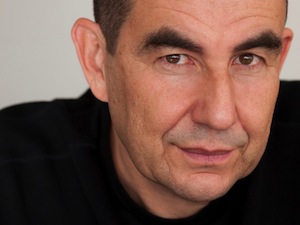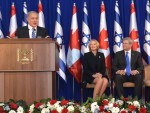Adam Brody played Seth Cohen in the show The O.C. and celebrated “Chrismukkah.” (photo from cookiesandsangria.files.wordpress.com)
If nothing else, The O.C., the popular 2003-07 American television show that featured the overblown dramas of hyper-privileged Orange County teens and their self-obsessed parents, can be credited with making a household name of “Chrismukkah” – the handy portmanteau that character Seth Cohen used to describe his interfaith family’s fusing of Christmas and Chanukah.
With intermarriage on the rise, many Jews in Canada and the United States are partnered or raising children with spouses of Christian backgrounds. Jewish Federations of Canada-United Israel Appeal’s 2011 National Household Survey found that the intermarriage rate in this country is 25%, about half the rate in the United States.
With Christmas being the centrepiece of the Christian calendar in the West – even for the increasing number of North Americans who celebrate Jesus’ birthday only culturally – many intermarried Jews find themselves in a quandary: should they embrace “Chrismukkah,” observe Christmas and Chanukah separately, or focus on creating an exclusively Jewish home by just celebrating the Festival of Lights.
While every family’s situation is different, it seems that many interfaith couples are finding ways to mark both holidays, but with the emphasis on each one’s cultural value.
This lines up with findings from the Pew Research Centre’s 2013 study A Portrait of Jewish Americans, which notes that younger generations of American Jews – 32% among Jewish millennials – often identify themselves as Jewish on the basis of ancestry, ethnicity or culture rather than religion. This matched the broader U.S. public’s shift away from religious affiliation, which is particularly prevalent among those in the 18-to-29 age range.
As for “Chrismukkah,” the Pew report found that about one-third of Jews surveyed said they’d had a Christmas tree in their home the year prior. Among those married to non-Jews, that number was 71%.
Tyler Irving isn’t Jewish, but his wife is, and the couple had their first child last year.
“So far, I’ve found it pretty easy to celebrate both sets of holidays,” he said. “We’ve been thinking about holidays as chances to reflect on culture, spend time with family and build strong bonds, and putting less emphasis on the religious aspects.”
Because Christmas is when they visit Irving’s parents, who live in the country, he expects that his own kids will view Christmas as a time to “be with Grandma and Grandpa,” while Chanukah will be “the chance to go to spend time with Bubbie and Zaide.”
Arielle Piat-Sauvé grew up in Quebec with a Jewish mother and a Catholic father.
“We always celebrated both holidays,” she said. “We went to my dad’s family for Christmas, though we did have a tree and did gifts at our own home. On Chanukah, we’d light the candles and do something with my [maternal] grandma and cousins. When I was younger, I’d get a gift for each night, but that wore off.”
If the two holidays coincided, her family would first light the Chanukah candles and then go to her grandparents’ for Christmas dinner. She stressed that neither holiday celebration focused on their religious components, but tradition and family time.
“Often, it’s easier for families to add than subtract,” said Rabbi Jordan Helfman of Toronto’s Holy Blossom Temple, a Reform synagogue that has among its members quite a few interfaith couples.
Interfaith families with children enrolled in Holy Blossom’s supplementary religious school are asked not to celebrate Christmas in their own homes, but going to a non-Jewish relative’s place for Christmas is OK, Helfman explained.
“My experience is it’s not hard for children to make that distinction, especially when the parents are clear about, ‘This is what we do in our house, and this is what Grandma does in her house.’ Kids are smarter than we give them credit for,” he said.
Rabbi Tina Grimberg of Congregation Darchei Noam, Toronto’s Reconstructionist synagogue, said her congregation has a number of interfaith families, many of whom get involved in the shul’s Chanukah festivities, or who light candles in their own homes.
“Do I go into people’s homes and see Christmas trees? Not often at all. Do trees come up in [interfaith congregants’] homes on Dec. 24? Most likely not … though if people do celebrate both Christmas and Chanukah, they don’t tell me,” she said.
Just because a non-Jewish partner hasn’t converted doesn’t mean Christmas is central in their life, she emphasized. And, ultimately, when addressing interfaith families’ practice of Judaism, there’s a larger conversation at play.
“It’s about how to live life in a Jewish context when you have deep roots in another reality. It’s not about, ‘I’m Jewish because I don’t celebrate Christmas.’ It’s ‘How many Jewish things do I do … do I do Shabbat, go to synagogue, have a seder, do mitzvot, say Shema in the morning?’” she said. “Some people will still have a tree, because it honors their grandma, while others feel they have enough of a rich Jewish life that they no longer need it.”
Rabbi Jillian Cameron is director of the Boston chapter of InterfaithFamily, a U.S. organization that supports interfaith couples exploring Jewish life. It provides families with educational materials and connections to inclusive organizations, programs and local clergy.
She stressed that, while she doesn’t see a single trend with regard to how families led by intermarried couples approach the holidays, at this time of year, many of them are focused on figuring out how to be respectful of both Chanukah and Christmas, whether they celebrate the holidays in their own home or that of an extended family member.
While Christmas can be tough to give up for many who are raised with it, Cameron said, the religious element is secondary to “the family connections, the music, the smells, the tree … there’s a big pull to the sensory nature of Christmas.”
She added that this speaks to the wider trend of younger people finding value in tradition, but focusing on things outside of the theological realm.
While families with one Jewish and one Christian parent observe the holidays at this time of year in all sorts of incarnations, it’s clear that many, as in the general population, are most concerned about preserving tradition and a sense of family togetherness.
– For more national Jewish news, visit cjnews.com









